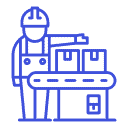The topic of traceability has been making headlines more and more in recent years, mostly in connection with dramatic recalls. Why is Traceability currently so hotly debated?
KH: Yes, there are a lot of dramatic cases. For example, almost all car manufacturers have had to carry out very expensive recall actions due to defective airbags in recent years. The Japanese company Takata, manufacturer of airbags and once one of the largest automotive suppliers worldwide went bankrupt as a result.These quality problems damage customer confidence, which can quickly become critical to business. In addition, due to the impact of Industry 4.0 and due to the current global economic development, the pressure to increase efficiency and reduce costs is getting higher. More and more companies are realizing that good traceability systems can help protect against these risks and help solve these challenges.
You are both passionate about traceability. How did you get to know each other and how did you get the idea to found NC-Vision together? How did your previous professional experience contribute to the foundation?
KH: I have been working as an entrepreneur in the software industry for over 30 years and was looking for a new and exciting challenge. I have known Florentin for quite some time. By chance he approached me about his product idea. I was immediately enthusiastic about the potential and it was clear that the project had to be implemented. I am contributing in NC-Vision with my entrepreneurial experience and Florentin with his technological know-how.
FS: In my past, I have worked intensively on software technology and traceability. In all my previous projects, for many reasons, I had to make compromises instead of implementing the best solution. With NC-Vision I have the ideal platform to realize my vision of the perfect product.
Were there any unexpected stumbling blocks during the foundation?
FS: For my area, the stumbling blocks were definitely the recruitment of suitable software developers. Over time, we gained the right colleagues from our network, through personnel service providers and word-of-mouth propaganda.
KH: Financing a software company in the start-up phase is a real challenge. We found a solution by extracting pre-seed funds in combination with bootstrapping. Winning the first customers was also not easy in that phase of the business. Because of our product, our vision and a lot of effort, we were able to solve that too.
What is your vision for NC-Vision?
FS: Our aim is to guarantee the highest quality and reliability over the entire product manufacturing cycle based on our innovative software technology. With our product, we want to define an industry standard for challenging traceability and be the guarantor for product quality worldwide.
How many employees do you have and from which areas do they come?
FS: We currently have 12 employees and we are growing strongly. As a technology-driven company, two thirds of them are highly qualified software engineers. In addition, there are the employees for service, sales and back office.
In 2020 you launched on the market with your traceability software solution CATS. How is your product accepted? What are the advantages over your competitors? And what does CATS actually mean?
FS: CATS stands for Cumulative Advanced Traceability System and is a complete standard out-of-the-box software solution that ensures the highest quality and reliability throughout the entire product manufacturing cycle.
KH: The feedback from the market is very good. The performance, flexibility and functionality of CATS are confirmed by our customers and partners. One of the main advantages is that we have a complete out-of-the-box solution that can be used immediately, nevertheless highly individual and flexible to the specific needs of the customer. In addition, we reduce the costs for implementation and subsequent operation by at least 50% to over 95% compared to other offers, depending on the customers’ situation.
What is the technology behind CATS and what is innovative about it?
FS: CATS is based on a unique self-developed No Code software technology. This ensures a highly efficient software architecture and at the same time reduces product development costs, because the software can be created quickly and easily without programming. This No Code technology is of course also available to our customers in CATS for their own use.
NC-Vision has two locations – in Germany and Romania. What were your reasons for settling in these locations, what role does the corporate culture play and where do you see differences between the markets?
KH: The starting point were the places where Florentin and I live, which from our point of view complement each other very well. In Romania we have cost advantages in product development and the proximity to our Romanian and Eastern European customers. From Germany, we serve the DACH and EU customers. Our corporate culture is very important to us. First of all, we cultivate a respectful and appreciative internal relationship. Every single employee is important for our joint success and the basis of our trust. I think that as a small company with distributed locations, this is one of the most important prerequisites for success. Externally, satisfied customers and employees are in tune with the demand for the best product and the best service. When it comes to the differences of the markets, I don’t see any difference. But it is important to serve customers locally, within the country or region.
What are your plans for the future with NC-Vision?
KH: We will continuously invest in the product and technology. As far as sales are concerned, the next step will be to tackle Eastern Europe and DACH and later the entire EU. For this purpose, we will also establish partnerships with solution and sales partners. On this basis, we want to continuously grow internationally.
What effects does the Corona virus have on your business?
KH: First of all, we are very concerned. In the immediate vicinity, but also from customers and partners, we are seeing a dramatic development, which unfortunately has probably not yet reached its climax. In the company we react with home office and guidelines on how to protect ourselves as best as we can against an infection. But I am also confident that things will pick up again after a certain period of time. During the financial crisis, I learned that companies use the freedom, especially in crises, to get their processes up and running and then to be well positioned during the next upswing.












